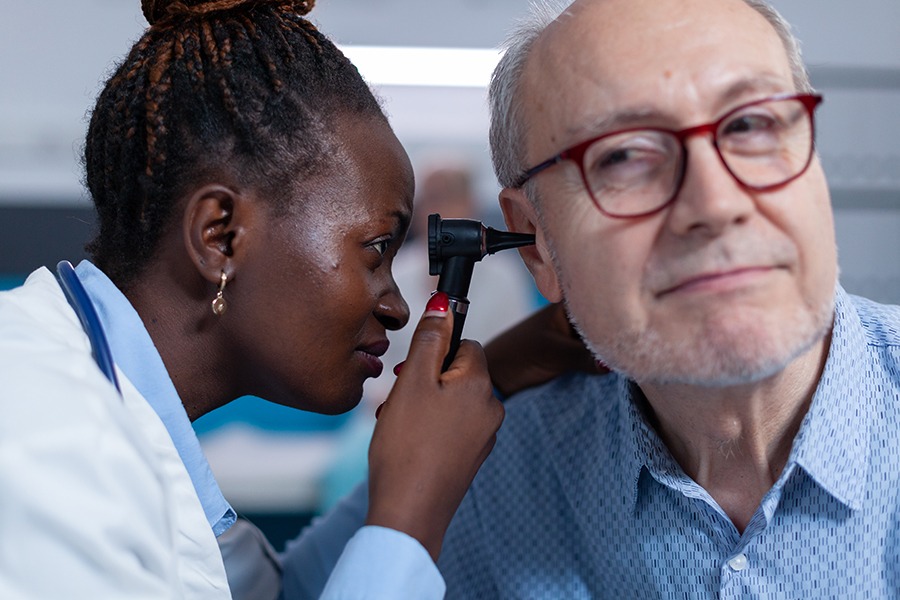Introduction
Hearing loss can happen to anyone, at any age. It’s a common condition that affects millions of people worldwide. It can be caused by a variety of factors, such as aging, exposure to loud noise, and certain medical conditions. Understanding the basics of deafness can help you make informed decisions about your hearing health and find the right treatment options.
In this blog post, we’re going to cover 7 things you should know about hearing disorder. We’ll discuss the different types of hearing disorder, causes, and symptoms, as well as common treatments and how to find a reputable hearing healthcare provider. We’ll also explore the importance of early detection and the impact of hearing loss on overall quality of life.
So, if you’re worried about your hearing or just want to learn more about this condition, keep reading! We hope this information will be helpful and informative for you.
Understanding the Types of Hearing Loss
When it comes to loss of hearing, there are three main types: conductive, sensorineural, and mixed. Understanding the difference between these types can help you better understand your own hearing loss and find the right treatment options.
Conductive deafness occurs when there is a problem with the outer or middle ear that prevents sound from getting to the inner ear. Common causes of conductive hearing loss include ear infections, a buildup of earwax, or a perforated eardrum. An example of this type of hearing loss is an ear infection that causes temporary hearing loss but can be treated with antibiotics.
Sensorineural hearing loss occurs when there is damage to the inner ear or the auditory nerve. This type of hearing loss is typically permanent and is caused by aging, exposure to loud noise, or certain medical conditions. An example of this type of hearing loss is noise-induced hearing loss caused by working in a loud factory for many years.
Mixed hearing disorder is a combination of conductive and sensorineural hearing loss. It occurs when there is a problem in both the outer or middle ear and the inner ear or auditory nerve. An example of this type of hearing disorder is a person who has a congenital malformation in the middle ear and also suffers from age-related hearing loss.
QUIZ - CAUSES OF HEARING LOSS IN CHILDREN
Common Causes of Hearing Loss
There are many different causes of deafness, and it can be caused by a combination of factors. Some of the most common causes include aging, exposure to loud noise, and certain medical conditions.
Aging is one of the most common causes of hearing disorder. As we get older, the hair cells in our inner ear that help us hear start to wear out, and this can lead to hearing loss. This is known as age-related hearing disorder or presbycusis. An example of this type of hearing loss is a person who is getting older and starts having trouble hearing speech in a noisy environment.
Exposure to loud noise is another common cause of hearing loss. When we are exposed to loud noises, like music at a concert or construction equipment, the hair cells in our inner ear can be damaged. This can lead to temporary or permanent hearing loss. An example of this type of hearing loss is a person who works in a loud factory or construction site, and after years of exposure, starts experiencing difficulty hearing.
Certain medical conditions can also cause hearing disorder. Some examples include ear infections, ototoxicity caused by certain medications, Meniere’s disease, and some genetic conditions. An example of this type of hearing loss is a person who has a medical condition such as Meniere’s disease, a disorder of the inner ear that affects hearing and balance and causes episodes of vertigo, tinnitus, and fluctuating hearing loss.
Recognizing the Symptoms of Hearing Loss
Recognizing the symptoms of hearing disorder is the first step in getting the help you need. While some people may experience sudden deafness, most people experience a gradual decline in their hearing over time. Common symptoms of hearing loss include difficulty hearing in noisy environments, difficulty understanding speech, and needing to turn up the volume on the television or radio.
One of the most common symptoms of hearing loss is difficulty hearing in noisy environments. This can make it hard to hear people talking at a party or in a crowded restaurant. For example, a person who starts having difficulty hearing speech in a noisy environment like a mall or a park and has to ask people to repeat themselves or gets tired quickly of trying to follow a conversation.
Another symptom of loss of hearing is difficulty understanding speech. This can make it hard to follow conversations, especially when there are multiple people talking at once. This can be especially frustrating when on the phone, for example, a person who starts having trouble understanding speech over the phone and has to ask the person on the other end to speak louder or slower.
A third symptom is needing to turn up the volume on the television or radio. This can be a sign that you’re having trouble hearing and that you need to have your hearing tested. For example, a person who starts turning up the volume on the television or radio to the point where other people in the room can hear it or starts experiencing discomfort or pain when watching or listening to something.
It’s important to note that these symptoms can vary depending on the individual and the type of hearing loss they have. If you’re experiencing any of these symptoms, it’s important to have your hearing tested by a professional.
The Importance of Early Detection
Early detection of deafness is important because it can help prevent further damage to your hearing and improve the chances of finding an effective treatment. It also allows you to take steps to protect your remaining hearing and improve your overall quality of life.
One of the most important reasons for early detection of hearing disorder is to prevent further damage to your hearing. If you wait too long to address your hearing loss, it can become more severe and harder to treat. For example, if a person who has been exposed to loud noise on a regular basis and starts experiencing some symptoms of hearing loss, like difficulty hearing speech in noise, but waits to address the problem, the damage to the hair cells in the inner ear can become irreversible and the person may end up with permanent hearing loss.
Another reason for early detection of hearing disorder is to improve your chances of finding an effective treatment. The earlier you detect your hearing loss, the more options you have for treatment. For example, if a person detects a hearing loss early, they may have the option of using a hearing aid, which amplifies sound and makes it louder. But if the person waits too long, the damage may be too severe for a hearing aid to be effective, and the person may need a cochlear implant instead, which is a more invasive and expensive procedure.
Additionally, early detection allows you to take steps to protect your remaining hearing. For example, if you have a mild hearing loss, you may be able to take steps to prevent it from becoming worse, such as avoiding loud noise, using earplugs, or taking certain medications.
In summary, early detection of hearing disorder is important because it can help prevent further damage to your hearing, improve your chances of finding an effective treatment, and improve your overall quality of life.
Available Treatments for Hearing Loss
There are many different treatment options available for loss of hearing, and the best option for you will depend on the cause and severity of your inability to hear. Some of the most common treatments include hearing aids, cochlear implants, and assistive listening devices.
One of the most common treatments for hearing inability is a hearing aid. A hearing aid is a small device that fits in or behind the ear and amplifies sound, making it louder. There are different types of hearing aids, such as behind-the-ear (BTE), in-the-ear (ITE), in-the-canal (ITC) and completely-in-canal (CIC). They can be customized to your specific needs and can help improve your ability to hear in a variety of settings. For example, a person who has age-related hearing disorder, a BTE hearing aid would be the best option, as it amplifies sound and makes it louder.
Another treatment option for hearing loss is a cochlear implant. A cochlear implant is a small device that is surgically implanted into the ear and directly stimulates the auditory nerve. This can help people with severe or profound hearing loss who may not be able to benefit from a hearing aid. For example, a person who has severe sensorineural hearing loss and is not able to hear with a hearing aid, a cochlear implant would be the best option, as it bypasses the damaged parts of the ear and directly stimulates the auditory nerve.
Assistive listening devices (ALD) are another option for people with hearing loss. ALDs are devices that help amplify sound in specific situations, such as the telephone, television, or in group settings. For example, a person who has difficulty hearing the telephone ring or people talking on the phone, an ALD such as a telephone amplifier or a captioned telephone would be a good option, as it amplifies the sound of the telephone and makes it louder.
In summary, there are many different treatment options available for hearing loss, and the best option for you will depend on the cause and severity of your hearing loss. Some of the most common treatments include hearing aids, cochlear implants, and assistive listening devices.
Deafness: A Journey of Challenges and Triumphs
Finding a Reputable Hearing Healthcare Provider
Finding a reputable hearing healthcare provider is essential to ensure that you get the best treatment for your loss of hearing. A qualified provider will be able to accurately diagnose your hearing disorder, recommend appropriate treatment options, and provide ongoing support and follow-up care.
One way to find a reputable hearing healthcare provider is to look for providers who are certified by professional organizations such as the American Speech-Language-Hearing Association (ASHA) or the American Academy of Audiology (AAA). These organizations have strict standards for their members and require them to have a certain level of education and experience. For example, a person who is looking for a hearing healthcare provider can search for an audiologist certified by the American Speech-Language-Hearing Association (ASHA) or the American Academy of Audiology (AAA) and can be sure that the provider has the necessary qualifications and experience.
Another way to find a reputable hearing healthcare provider is to ask for recommendations from friends, family, or your primary care physician. They may be able to recommend providers they have seen and trust. Additionally, you can check online reviews or ask your local chapter of the Hearing Loss Association of America (HLAA) for recommendations. For example, a person who is looking for a hearing healthcare provider can ask friends, family or their primary care physician for recommendations, they may have had a positive experience with a provider they can recommend.
It’s also important to visit the provider and ask questions about their qualifications, experience and treatment options. A reputable provider will be happy to provide you with information and answer any questions you have. For example, a person who is looking for a hearing healthcare provider can schedule a consultation with the provider and ask about their qualifications, experience and treatment options, the provider should be happy to provide the information and answer any questions.
In summary, finding a reputable hearing healthcare provider is essential to ensure that you get the best treatment for your hearing loss. You can look for providers who are certified by professional organizations such as the American Speech-Language-Hearing Association (ASHA) or the American Academy of Audiology (AAA), ask for recommendations from friends, family, or your primary care physician, check online reviews or ask your local chapter of the Hearing Loss Association of America (HLAA) for recommendations and visit the provider and ask questions about their qualifications, experience and treatment options.
The Impact of Hearing Loss on Quality of Life
Hearing impairment can have a significant impact on a person’s quality of life. It can affect a person’s ability to communicate with others, their ability to enjoy music and other sounds, and their overall sense of well-being.
One of the most significant impacts of hearing Inability is on a person’s ability to communicate with others. People with deafness may have difficulty hearing and understanding speech, especially in noisy environments. This can make it hard to have conversations with friends and family, participate in group activities, and even make phone calls. For example, a person who has hearing loss may have trouble hearing in a noisy restaurant and may not be able to join in a conversation with friends and family, leading to isolation and depression.
Another impact of hearing disorder is on a person’s ability to enjoy music and other sounds. People with hearing loss may not be able to hear music or other sounds as clearly, which can make it less enjoyable. This can also make it hard to appreciate nature sounds, such as birds singing or waves crashing on the beach. For example, a person who has hearing loss may have trouble hearing the music at a concert and may not be able to enjoy the experience as much as they used to.
Hearing loss can also have a negative impact on a person’s overall sense of well-being. It can cause feelings of frustration, stress, and even depression. It can make it hard to stay engaged with life and can lead to social isolation. For example, a person who has hearing loss may feel isolated in social situations, and may not want to go out with friends and family, leading to depression.
Conclusion
In conclusion, hearing impairment is a common condition that affects millions of people worldwide. Understanding the types of hearing disorder, common causes, and symptoms, as well as the importance of early detection and available treatment options, can help you make informed decisions about your hearing health and improve your overall quality of life.
We hope this blog post has provided you with useful information on hearing disorder, from understanding the different types of hearing loss and common causes, to recognizing the symptoms and the importance of early detection. With the right treatment options and the help of a reputable hearing healthcare provider, you can improve your ability to hear and enjoy life to the fullest.
It’s important to remember that hearing loss is a condition that can be managed, and early detection is key. If you’re experiencing any symptoms of hearing loss, we encourage you to have your hearing tested by a professional. With the right help, you can take steps to protect your remaining hearing and improve your overall quality of life.






